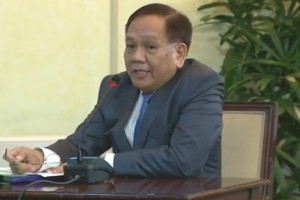News
Time to bury Marcos issue, move forward: Peralta

“I hope that issue has really been buried you honor, because if we do not bury that issue then we cannot move on and I still believe that whatever is the past we have to move on. We will not improve as a nation if we don’t do that,” said Peralta, who penned the decision on the case. (PNA file photo)
MANILA — Associate Justice Diosdado Peralta said the country should move forward as he stood firm on the decision of the Supreme Court (SC) allowing the burial of the late President Ferdinand Marcos at the Libingan ng mga Bayani (LNMB) despite protests from victims of human rights violations during his term.
Peralta made the remark in response to the question of the Judicial and Bar Council (JBC) during the public interview for Chief Justice aspirants on whether the decision has really put closure between the grieving family of Marcos and those injured during the martial law years.
“I hope that issue has really been buried you honor, because if we do not bury that issue then we cannot move on and I still believe that whatever is the past we have to move on. We will not improve as a nation if we don’t do that,” said Peralta, who penned the decision on the case.
“That’s why I said, I put that as part of my ponencia, as a reminder to those who will read my decision that there is a need to move on. We cannot live on the past. We have to move on,” he added.
He also expressed belief that the decision has brought unity to the country, noting that those complaining before against the burial have become silent on the matter.
“We are now focused on issues confronting the nation. Unlike before the burial, I believe there were so many issues unresolved during those times,” he pointed out.
Peralta is the second most senior among the Supreme Court magistrates vying for the Chief Justice post – next to Associate Justice Teresita Leonardo-de Castro.
While citing seniority as important in choosing a Chief Justice, Peralta said it may not be the most important factor.
Peralta, meanwhile, said de Castro and his friend, Associate Justice Lucas Bersamin, are both of them are capable and competent to lead the Supreme Court.
Peralta, a former Sandiganbayan presiding justice, was named to the High Court by former President Gloria Macapagal-Arroyo on Jan. 13, 2009.
He served as Quezon City Regional Trial Court Branch 95 judge from 1994 to 2002.
He will retire in March 2022.
Meanwhile, Peralta said the even there are significant improvement in the reduction of backlog of cases with the continuous trial program of the Supreme Court, the courts are failing in drug cases because the requirement of Comprehensive Dangerous Drugs Act of 2002 is humanly impossible for a trial court judge to comply.
Peralta said disposal of cases increased significantly since they started implementing the continuous trial system in 2012.
It was pilot tested in criminal cases in selected courts in Quezon City then later later expanded to cover 52 pilot courts in Metro Manila, both in metropolitan trial courts (MeTCs) and regional trial courts (RTCs).
Then, on September last year, the high court implemented it in all trial courts, including the Sandiganbayan and the Court of Tax Appeals (CTA).
Peralta said from 1.12 percent disposal rate of RTC’s, it has increased to 44.8 percent, for family courts, disposal of cases increased to 26 percent.
However, Peralta said in drug cases, the law made a humanly impossible timeframe to resolve the cases.
Under Article XI, Section 90 of the Comprehensive Dangerous Drugs Act of 2002, trial of the case must be resolved not later than 60 days from the date of filing of the Information (charge sheet) while decision of the case must be issued within 15 days from submission “and they are having a hard time.”
He explained that if the drug courts will schedule the trial during arraignment, they could handle six to seven cases that will fall within the 60 day deadline.
Considering the evidence that should be examined, witnesses to testify, laws to be studied, Peralta said the 60 day deadline “is humanly impossible.”
Peralta noted that it was a good thing that Senator Richard Gordon was present during the deliberation as he hinted on possible amendment to the anti-drug law, particularly on the deadline given to the judges.
He added that there are also circumstances trial court judges could not control including the police officers who file complaints but when it was their turn to testify, they simply “disappear.
”
If appointed Chief Justice, Peralta said he would prefer a regular summit between the pillars of justice—judiciary, Department of Justice (DOJ), law enforcement to come up with measures on properly implementing the anti-drugs law.





















